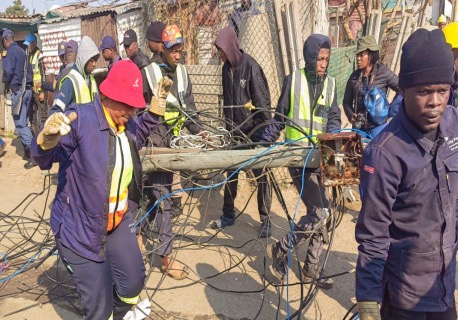
Robinson Nqola
City Power successfully cut off illegal connections and seized about 18,000kg of aluminium cable conductors worth R1.5 million from Kanana informal settlement in Rabie Ridge. The operation, part of the entity’s plan to reduce high electricity consumption, was carried out on Wednesday, 31 July 2024, in collaboration with law enforcement agencies.
Residents of the informal settlement have been illegally tapping into the network, stealing electricity, contributing to overloading that has tripped power in formal housing, and damaged infrastructure. Since the start of the year, City Power has had to replace eight transformers in the area damaged by illegal connections. Currently, three additional transformers need replacing in Rabie Ridge due to overloading.
One person was arrested for illegally connecting electricity, with several others arrested in possession of stolen cables used for illegal connections. Most of the confiscated aerial bundle cables are stolen from streetlights across the city, turning once-lit areas into dark zones.
Last month, the Johannesburg municipality’s electricity utility introduced load reduction in response to the increasing risk of grid collapse. At that stage, the load on the network had reached alarming levels, forcing the utility to take drastic measures to avoid a city-wide blackout.
Part of the load reduction measures City Power committed to undertaking was the removal of illegal connections significantly contributing to the system’s load. Since the start of July 2024, City Power has cut 29 illegal connections across informal settlements in the city, including Kapok, Viking, Ennerdale Extension 8 & 9, Riverlea, and Grobler Park. The utility will intensify disconnections to reduce the burden on the grid.
These illegal connections not only endanger residents’ lives but also contribute to frequent power supply interruptions unfairly affecting neighbouring areas paying for services. In the past few years, there have been several cases of electrocution, with many losing their lives due to unsafe connections. Illegal connections also contribute to massive revenue losses. In the previous financial year, the entity lost over R100 million due to illegal connections and other technical and non-technical factors.
City Power CEO Tshifularo Mashava commended law enforcement agencies for assisting the utility in combating illegal connections. “We are grateful to all the law enforcement agencies for supporting our efforts in dealing with electricity theft, particularly during this period when our network is under severe strain.
She said while it was essential to actively remove illegal connections, it was a short-term solution. “Illegal connections are part of a larger housing challenge that must be addressed to enable us to bring in electricity services in some of these informal settlements. We have emphasised that it would be advantageous to have the 321 informal settlements in the City of Johannesburg electrified, as we would be able to quantify the capacity needed and generate revenue from electricity purchases. This past financial year, we electrified five informal settlements: Slovo Park and Patsing & Veggieland, Princess plot, Matholesville, and Kliptown.”
City Power has also invested in microgrids in partnership with the Gauteng provincial government to provide off-grid solutions to some informal settlements.
The City of Johannesburg has a backlog of over 300 informal settlements. For City Power to connect electricity services, the department of Human Settlements must first certify the area as habitable as part of the formalisation process. Once formalised, City Power can then bring in power supply services subject to budget availability. Part of Kanana disconnected today was informed as not qualifying for electrification as it is on unsuitable land for human settlement.
SOURCED FROM THE CITY’S WEBSITE.

